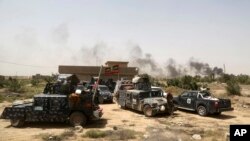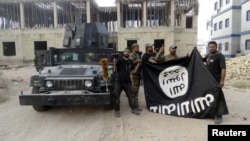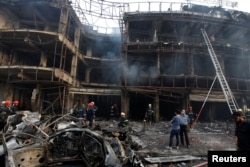Islamic State jihadists are continuing to lose control of territory they had captured in Iraq and Syria, the British think tank IHS said Sunday.
IHS said Islamic State lost 12 percent of the territory it held in the first half of 2016 on top of the 14 percent it lost last year. In all, IHS said that as of last week Islamic State controls about 68,300 square kilometers of land in the two countries.
IHS analysts said Islamic State has lost the territory in Syria as it has come under increasing pressure from Syrian forces backed by Russian airstrikes and an Arab-Kurdish alliance backed by a U.S.-led coalition. In Iraq, government forces supported by a U.S. aerial bombardment have ended Islamic State control of several key cities, including Ramadi and Fallujah, even as Islamic State still controls the second largest Iraqi city, Mosul.
The IHS assessment did not break down the Islamic State losses in the two countries in 2015 and in the last six months. But it appears to be somewhat the same as a U.S. military conclusion in May, that Islamic State has lost 45 percent of the territory it once held in Iraq and 16 to 20 percent in Syria.
Even as Islamic State has lost territory, however, it has been able to launch mass casualty bombings and shootings in Baghdad, the Iraqi capital; Paris and Brussels, as well as inspire attacks elsewhere in Europe and the United States.
IHS senior analyst Columb Strack said Islamic State's loss of territory likely means that it would engage in more such attacks.
"As the Islamic State's caliphate shrinks and it becomes increasingly clear that its governance project is failing, the group is reprioritizing insurgency," Strack said. "We unfortunately expect an increase in mass casualty attacks and sabotage of economic infrastructure, across Iraq and Syria, and further afield, including Europe."






